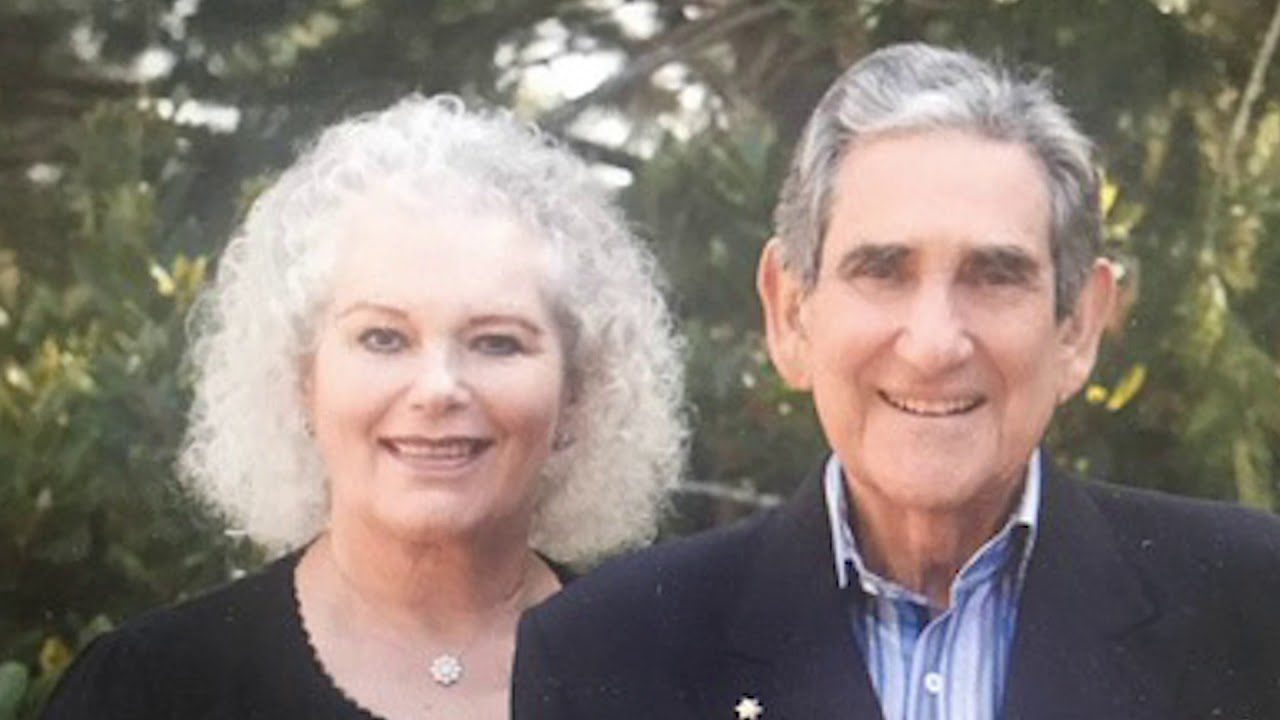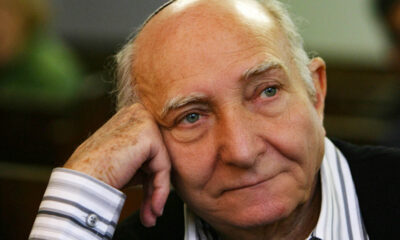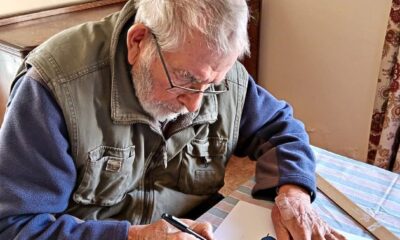
Featured Item

Eric Samson talks to Howard Sackstein about his life
Following the death of iconic businessman and philanthropist Eric Samson this week, we are reprinting this interview done in 2013.
I had the privilege to be a fly on the wall when Eric and Sheila Samson spent an hour telling Howard Sackstein about their roller-coaster ride from starting with nothing to becoming bigger than De Beers in July. Why a privilege? Because Eric Samson is renowned for keeping out of the public arena and has refused even to speak to the Sunday Times, the Financial Mail, and Business Day in recent stories they have written about him.
So secretive has Samson kept his private life, most among South African Jewry know of him only through three things: his massive philanthropic activities; his close friendship with Madiba and Graça Machel; and the enormous wealth he generated (although not being a listed business, the numbers are anyone’s guess).
But let me not get ahead of myself, read this amazing account of an amazing conversation, with some added research from what little information exists to give flavour.
Where it all began…
Eric Samson showed signs he would make a great businessman while still at school. After a cake sale at Parkview Junior, the principal announced that Samson had raised the largest amount of money ever from selling biscuits and sweets, a whopping £19, 9s and 6d. That was 65 years ago.
Samson’s business career goes back to his late teens when he joined his father, David, in business back in 1958. His father was in the agency business, Samson says, mainly selling wire products. “I got my degrees from my dad,” he says of the financial training he received. But he and his father didn’t always see eye to eye.
When young Samson wanted to start holding stock and merchandising the products five years later, he says his dad was against it. “I wanted to be the master of my own destiny. We were agents for fencing wire and a little bit of steel product, and I started merchandising in 1962.”
Samson was now on his own in business, and that desire to be master of his own destiny has never abated. To this day, he wants control of the businesses he’s involved in.
One of the young agent’s major principles at the time was wire producer S Machanick of Cape Town. But the Machanick family sold their products only in the Cape. Samson and his father represented them in what were then the other three provinces in South Africa
Taking charge…
“After a few years of shortages of allocations [of steel] from the mills,” Samson says, business wasn’t going too well for the Machanicks. “They approached me in 1965, and I entered into a joint venture with the Machanick family.” While fencing material remained the main business of Mechanic Fencing, in 1969 Eric led an expansion into the steel side of the business.
In 1974, Samson bought out the Machanick family’s interest, and he now owned 100% of a business called Machanick Steel & Fencing. “I decided to make the name Macsteel,” he says, laughing, I knew I couldn’t go wrong in a business with a Scottish name and a Jewish owner.”
Samson had learned by now that he needed to “think big and to work out a game plan – how one could grow in the market”. Over the years, he grew the steel business to the extent that wire products now represent only 5% of Macsteel’s business.
Samson had developed the innovative model of steel service centres where people could order any amount of any steel product, cut to any size. They started popping up all around the country, and it wasn’t long before Macsteel was moving a sizable percentage of the steel sold in South Africa.
“The local business always carried on and grew,” says Samson, but his entrepreneurial spirit wasn’t going to be satiated in the South African marketplace. In the late 1970s, Macsteel started exporting to African states and by 1980, he had started to export to markets in the Far East and South America.
Shooting for the stars…
By now, the growth bug had bitten Samson hard. Whatever he touched turned to steel. He was on a roll. “In 1982, I took over Leo Raphaeli & Sons who were then the biggest commodity exporting company in South Africa.” Samson was mainly interested in their steel business, he says, but with it becoming tough for South African firms to trade internationally, the Raphaelis were happy to sell it all.
Now in his mid-forties, Samson wasn’t planning to stop for anything. Having ensured that he had a sound management team behind him, Eric largely trusted them to absorb each new business he acquired and assimilate it into the rapidly growing and globalising Macsteel group. He had bigger fish to fry.
The following year, in 1983, Samson decided it was time to take his successful service-centre model further afield. Not shy of anyone, he decided to start in the United States, where he worked with the giant Associated Metals & Minerals.
In 1985, “Associated Metals got into trouble and I did a joint venture with them,” says Samson nonchalantly. “They were global and that gave me the breakthrough of being able to distribute worldwide.”
A builder, but not a gambler…
Today, Macsteel has offices in 36 countries and on every continent in the world. When Sackstein asked Samson if this rapid expansion into globalising his business hadn’t been a gamble, his retort was that “it wasn’t a gamble, it was a well-calculated risk!”
Besides, he said, “I’ve always had the strong home base that allowed me to expand overseas.”
Along the way, Samson, who is and has always been passionate about Israel, established a service-centre business there. Cleverly called Iskoor, it was originally a joint venture with Iscor and Israel’s largest industrial and steel company Koor Metals. After a while, says Samson, “Iscor’s managing director came to me and said he was having trouble with trade unions in Israel. He offered me the opportunity to take over its interest as, he said, ‘only a Jew could handle another Jew’.”
Eric and Koor were left with 50% each, but he later bought 1% from Koor, “as I always like to have management control.”
Samson was shipping steel from anywhere to everywhere, and it didn’t take him too long to see the opportunity that created. Macsteel International, a joint venture between global steel giant ArcelorMittal and Macsteel, (“We have controlling interest,” says Samson) added a large shipping business to the Macsteel empire.
The African steel service-centre operation, known as MSCSA, is a subsidiary of Macsteel Holdings, which has never listed. The company as a whole had a turnover of about $9 billion (R135.2 billion) in 2011, according to the Financial Mail – bigger than De Beers – and is the largest privately held company in South Africa. MSCSA alone employs more than 5 000 people according to the Financial Mail.
Asked if he had ever been involved in manufacturing steel, Samson told Sackstein that Macsteel has never even considered manufacturing. “We never had a mill, we cut and sell steel. We have stuck to what we know best.”
And now, aged nearly 75 and with none of his children interested in the business, Samson has started to sell up. He promised his family he would retire at 55, says his devoted wife, Sheila. But she has become resigned to the fact that he will probably never retire – she’s happy that he’s just cutting back.
Samson began the process of scaling back two years ago when he when he sold his US operation, Macsteel Service Centres USA, to Germany’s Klöckner and Company for $660 million (R9.9 billion).
“Your timing was good,” remarked Sackstein.
“I’ve always been known to sell high and buy low,” responded Samson laughing.
Now the South African service-centre business is up for sale.
Samson says that he has been “very fortunate” in not having had to take any hard knocks in his charmed career. “The closest I came was some disappointments, at times, in the earlier days with Iscor before I came right with getting export distribution rights.”
He says has also found it “tough when going into overseas ventures”. Business is about people, he says, and “when you take over companies you like to take over the management”. But applying that principle meant not always having the best people in the job.
Eric Samson the philanthropist…
Samson says his deep pocketed involvement with the South African Jewish community harks back to “my good friend Mendel”, the late Mendel Kaplan. “He was already deeply involved, and I always gave accordingly,” says Eric. In 1974, “Mendel came to me and he said we have to set an example.”
Samson says that in those days, he used to give about R20 000 a year. Kaplan reminded him that he, Samson, was now earning more and that the community need was greater. “I gave Mendel R100 000, and afterwards he said he was only going to ask me for R50 000,” says Samson laughing.
From that day on, he was hooked on philanthropy.
He recalls Cape community fundraising supremo Fritz Frank. They called him the Boston Strangler, says Samson as an aside. “Fritz had 30 people in a room and he said, ‘Eric is at last giving what he should.’” Samson says he stood up, and said, “Mr Chairman, I have always given, and now that I am more successful, I am giving more!”
“Giving to Israel has always been close to my heart,” he says. He recalls his grandmother showing him pictures of their family in Europe. “Only two of them survived,” and that’s why he feels Israel is so important.
“Thank goodness I have been blessed and have been able to give,” Samson says. I have been charitable, he confirms, pointing out that “the more you give, the more you get”.
- The full version of this story was published in the ‘Absa Jewish Achievers Magazine’ in 2013.











Wendy Machanik
January 21, 2021 at 11:43 am
Reply to the tribute to Eric Samson by Chief Rabbi Goldstein
“As always you have captured the essence in a wonderful worthy, & deserving tribute to a true Tzadik a man not only of stature but of true valour – Without really knowing me when I cried out for assistance when my erstwhile business went awry, he immediately and generously came to my assistance, without hesitation.
I am writing this with tears flowing as I remember in gratitude, his unreserved & generous kindness towards me, a stranger to him. Thank you for giving me this opportunity of paying tribute to a truly great man